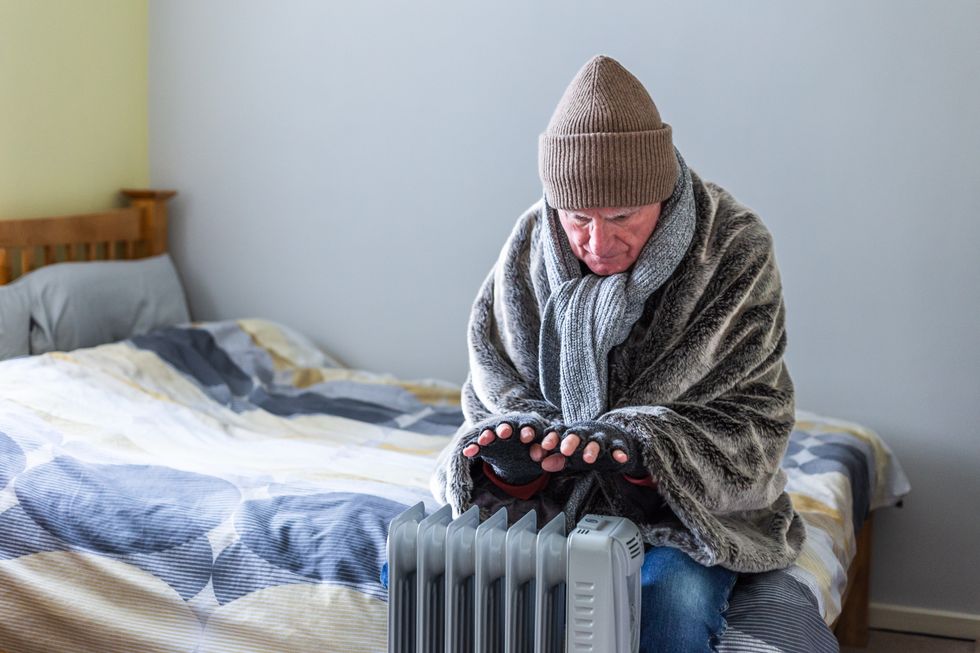Eliana Silver
Guest Reporter
Medical experts are warning men about a peculiar cold-weather phenomenon known as 'winter penis' as frigid temperatures approach America's east coast.
The condition causes male genitals to temporarily shrink and can lead to difficulties in the bedroom, according to health professionals.
Dr Saransh Jain, a world-renowned sexologist, explains that cold temperatures trigger the body to restrict blood flow to extremities, including the penis.
This natural response can result in a size reduction of up to 50 per cent as the body prioritises keeping vital organs warm.

The condition particularly affects men who already experience erectile dysfunction, making their symptoms more challenging to manage during cold weather spells.
Jain explains this reaction is known as vasoconstriction, where blood vessels constrict to limit blood flow to the penis.
"When it's cold out, your body limits blood flow to extremities like fingers, toes, and yes - your penis to retain heat in your vital organs," says Jain.
The process serves an evolutionary purpose as "the shaft of the penis and testicles move closer to the body to maintain the optimal temperature for sperm production," he adds.
This natural defence mechanism helps protect sperm and testes during cold weather.
The restricted blood flow not only causes shrinkage but can make it more challenging for men to maintain an erection.
Most men experience the condition only briefly and occasionally, though it can be more severe for those with underlying erectile issues.
According to the National Institutes of Health, an estimated 30 million men in the United States suffer from erectile dysfunction.
These men may find their condition particularly challenging during the winter months as cold weather exacerbates existing difficulties.
The combination of erectile dysfunction and winter-induced vasoconstriction can create a compound effect on sexual function.
Jain emphasises that stress and anxiety can further complicate matters, as high stress levels increase cortisol production.
"High stress levels increase cortisol, the stress hormone, which, in turn, decreases testosterone, the sex hormone responsible for libido and erections," he explains.

Despite the concerning nature of 'winter penis', Dr Jain reassures that the condition is temporary.
The condition has a straightforward solution - warming up will return the organ to its normal size as the body stops adapting to cold temperatures.
To combat the effects, Jain recommends wearing insulated underwear and trousers and limiting exposure to cold temperatures where possible.
Staying hydrated is crucial, as "dehydration exacerbates the effects of vasoconstriction," according to Jain.
While 'winter penis' is typically harmless, experts warn men not to dismiss persistent changes to their genitals.
Jain advises: "Don't be embarrassed to discuss penis health and any changes you've noticed with your doctor."
"Early diagnosis and treatment of underlying conditions is key to preventing permanent damage and supporting your long term sexual and penile health," he adds.
Men experiencing longer-term changes in genital shape or blood flow should seek medical advice as a precaution.
This is particularly important as erectile dysfunction can sometimes indicate serious health conditions like cardiovascular disease.
A range of treatments and medications are available for those suffering from erectile dysfunction.
The condition should not be confused with frostbite, which is a serious medical condition requiring urgent attention when tissue is exposed to extremely cold temperatures.
Find Out More...
The condition causes male genitals to temporarily shrink and can lead to difficulties in the bedroom, according to health professionals.
Dr Saransh Jain, a world-renowned sexologist, explains that cold temperatures trigger the body to restrict blood flow to extremities, including the penis.
This natural response can result in a size reduction of up to 50 per cent as the body prioritises keeping vital organs warm.

The condition particularly affects men who already experience erectile dysfunction, making their symptoms more challenging to manage during cold weather spells.
Jain explains this reaction is known as vasoconstriction, where blood vessels constrict to limit blood flow to the penis.
"When it's cold out, your body limits blood flow to extremities like fingers, toes, and yes - your penis to retain heat in your vital organs," says Jain.
The process serves an evolutionary purpose as "the shaft of the penis and testicles move closer to the body to maintain the optimal temperature for sperm production," he adds.
This natural defence mechanism helps protect sperm and testes during cold weather.
The restricted blood flow not only causes shrinkage but can make it more challenging for men to maintain an erection.
Most men experience the condition only briefly and occasionally, though it can be more severe for those with underlying erectile issues.
According to the National Institutes of Health, an estimated 30 million men in the United States suffer from erectile dysfunction.
These men may find their condition particularly challenging during the winter months as cold weather exacerbates existing difficulties.
The combination of erectile dysfunction and winter-induced vasoconstriction can create a compound effect on sexual function.
Jain emphasises that stress and anxiety can further complicate matters, as high stress levels increase cortisol production.
"High stress levels increase cortisol, the stress hormone, which, in turn, decreases testosterone, the sex hormone responsible for libido and erections," he explains.

Despite the concerning nature of 'winter penis', Dr Jain reassures that the condition is temporary.
The condition has a straightforward solution - warming up will return the organ to its normal size as the body stops adapting to cold temperatures.
To combat the effects, Jain recommends wearing insulated underwear and trousers and limiting exposure to cold temperatures where possible.
Staying hydrated is crucial, as "dehydration exacerbates the effects of vasoconstriction," according to Jain.
While 'winter penis' is typically harmless, experts warn men not to dismiss persistent changes to their genitals.
Jain advises: "Don't be embarrassed to discuss penis health and any changes you've noticed with your doctor."
"Early diagnosis and treatment of underlying conditions is key to preventing permanent damage and supporting your long term sexual and penile health," he adds.
Men experiencing longer-term changes in genital shape or blood flow should seek medical advice as a precaution.
This is particularly important as erectile dysfunction can sometimes indicate serious health conditions like cardiovascular disease.
A range of treatments and medications are available for those suffering from erectile dysfunction.
The condition should not be confused with frostbite, which is a serious medical condition requiring urgent attention when tissue is exposed to extremely cold temperatures.
Find Out More...
